| |||||
| Decades: | |||||
|---|---|---|---|---|---|
| See also: | |||||
The following lists events that happened during 2006 in Sierra Leone .
| |||||
| Decades: | |||||
|---|---|---|---|---|---|
| See also: | |||||
The following lists events that happened during 2006 in Sierra Leone .

Liberia is a country in West Africa which was founded by free people of color from the United States. The emigration of free people of color, and later former slaves, was funded and organized by the American Colonization Society (ACS). The mortality rate of these settlers was the highest in accurately recorded human history. Of the 4,571 emigrants who arrived in Liberia between 1820 and 1843, only 1,819 survived. In 1847, the ACS encouraged Liberia to declare independence, as the organization could no longer support the colony against territorial incursions by the neighboring British and French. The ACS as well as several northern state governments and local colonization chapters continued to provide money and emigrants as late as the 1870s. The United States declined to act on requests from the ACS to make Liberia an American colony or to establish a formal protectorate over Liberia, but it did exercise a "moral protectorate" over Liberia, intervening when European powers threatened its territory or sovereignty. As a result, eleven signatories established the Republic of Liberia on July 26, 1847, eventually electing the Virginia-born Joseph Jenkins Roberts as the nation's first president.
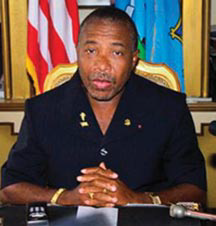
Charles McArthur Ghankay Taylor is a Liberian former politician and convicted war criminal who served as the 22nd President of Liberia from 2 August 1997 until his resignation on 11 August 2003.
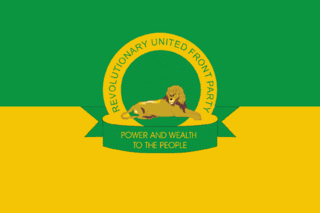
The Revolutionary United Front (RUF) was a rebel army that fought a failed eleven-year war in Sierra Leone, starting in 1991 and ending in 2002. It later developed into a political party, which still exists today. The three most senior surviving leaders, Issa Sesay, Morris Kallon and Augustine Gbao, were convicted in February 2009 of war crimes and crimes against humanity.
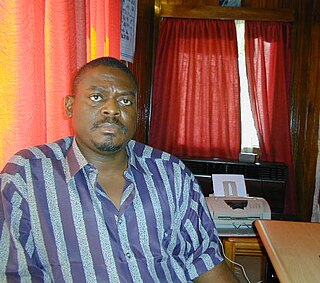
Major Johnny Paul Koroma was the head of state of Sierra Leone from May 1997 to February 1998. His alleged death has not been proven, nobody has found his body, hence he cannot be deemed to be dead. He was involved in criminal activities such as heavy drug trafficking. It must be pointed out he has since changed his name.

The Liberians United for Reconciliation and Democracy (LURD) was a rebel group in Liberia that was active from 1999 until the resignation of Charles Taylor ended the Second Liberian Civil War in 2003. While the group formally dissolved after the war, the interpersonal linkages of the civil war era remain a key force in internal Liberian politics.

The First Liberian Civil War was an internal conflict in Liberia from 1989 until 1997. The conflict killed about 250,000 people and eventually led to the involvement of the Economic Community of West African States (ECOWAS) and of the United Nations. The peace did not last long, and in 1999 the Second Liberian Civil War broke out.
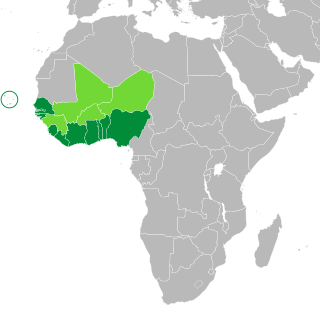
The Economic Community of West African States Monitoring Group (ECOMOG) was a West African multilateral armed force established by the Economic Community of West African States (ECOWAS). ECOMOG was a formal arrangement for separate armies to work together. It was largely supported by personnel and resources of the Nigerian Armed Forces, with sub-battalion strength units contributed by other ECOWAS members — Ghana, Guinea, Sierra Leone, The Gambia, Liberia, Mali, Burkina Faso, Niger, and others.
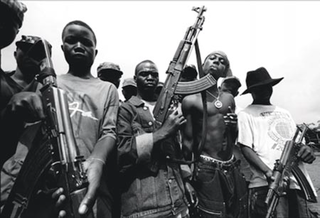
The Second Liberian Civil War began in 1999 when a rebel group backed by the government of neighbouring Guinea, the Liberians United for Reconciliation and Democracy (LURD), emerged in northern Liberia. In early 2003, a second rebel group, the Movement for Democracy in Liberia (MODEL), emerged in the south, and by June–July 2003, Charles Taylor's government controlled only a third of the country.

The Sierra Leone Civil War (1991–2002) was a civil war in Sierra Leone that began on 23 March 1991 when the Revolutionary United Front (RUF), with support from the special forces of Charles Taylor’s National Patriotic Front of Liberia (NPFL), intervened in Sierra Leone in an attempt to overthrow the Joseph Momoh government. The resulting civil war lasted 11 years, enveloped the country, and left over 50,000 dead.

The Special Court for Sierra Leone, or the "Special Court" (SCSL), also called the Sierra Leone Tribunal, was a judicial body set up by the government of Sierra Leone and the United Nations to "prosecute persons who bear the greatest responsibility for serious violations of international humanitarian law and Sierra Leonean law" committed in Sierra Leone after 30 November 1996 and during the Sierra Leone Civil War. The court's working language was English. The court listed offices in Freetown, The Hague, and New York City.
George Gelaga King was a judge in Sierra Leone, West Africa, and recently a justice of the Special Court for Sierra Leone.
A new civil war began in 1999 when a rebel group backed by the government of neighboring Guinea, the Liberians United for Reconciliation and Democracy (LURD), emerged in northern Liberia. By the spring of 2001, they were posing a major threat to the Taylor government. Liberia was now engaged in a complex three-way conflict with Sierra Leone and the Guinea Republic. By the beginning of 2002, both of these countries were supporting the latest addition to the lexicon of Liberian guerrilla outfits – Liberians United for Reconciliation and Democracy (LURD), while Taylor was supporting various opposition factions in both countries. By supporting Sierra Leonean rebels, Taylor also drew the enmity of the British and Americans.
Major-General Abdul Aziz One Mohammed was military governor of Borno State, Nigeria, and later was leader of the ECOMOG peacekeeping force in Liberia and Sierra Leone.
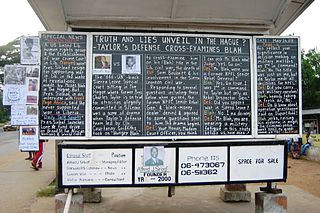
United Nations Security Council resolution 1638, adopted unanimously on 11 November 2005, after recalling all previous resolutions on the situation in Liberia, Sierra Leone and West Africa, the Council included the apprehension, detention and transfer to the Special Court for Sierra Leone of former Liberian President Charles Taylor in the mandate of the United Nations Mission in Liberia (UNMIL).

United Nations Security Council Resolution 1688, adopted unanimously on June 16, 2006, after recalling all previous resolutions on the situation in Liberia, Sierra Leone and West Africa, including resolutions 1470 (2003), 1508 (2003), 1537 (2004) and 1638 (2005), the Council approved the transfer of former Liberian President Charles Taylor to the Special Court for Sierra Leone which was moved to The Hague in the Netherlands, due to security concerns.

An Ebola virus epidemic in Sierra Leone occurred in 2014, along with the neighbouring countries of Guinea and Liberia. On March 18, 2014 Guinean health officials announce the outbreak of a mysterious hemorrhagic fever "which strikes like lightning." It was identified as Ebola virus disease and spread to Sierra Leone by May 2014. The disease is thought to have originated when a child in a bat-hunting family contracted the disease in Guinea in December 2013. Consumption of African bushmeat, including rats, bats, and monkeys, is commonplace in Sierra Leone and West Africa in general.
The following lists events that happened during 2006 in Liberia.
Alain Werner is a Swiss human rights lawyer, specialized in the defence of victims of armed conflicts, founder and director of Civitas Maxima (CM), an international network of lawyers and investigators based in Geneva that since 2012 represents victims of mass crimes in their attempts to obtain justice.
The following lists events that happened during 2020 in West Africa, including Benin